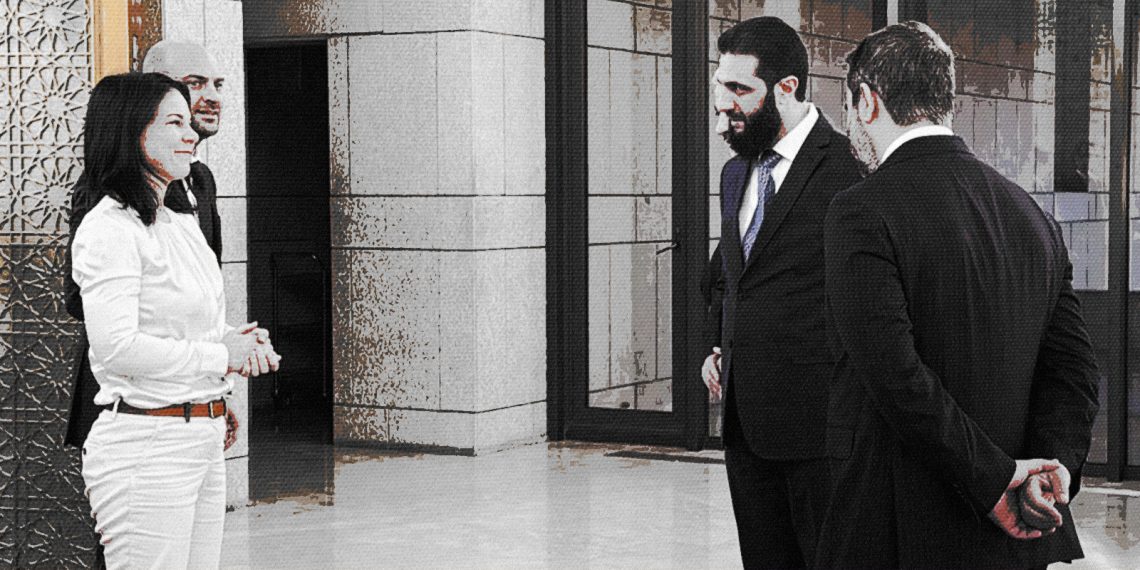Ahmad al-Sharaa, once known as Al-Fateh and later Al-Jolani, sparked a heated debate after refusing to shake hands with Germany’s Foreign Minister during her recent visit to Damascus. While this act drew criticism and confusion, especially in the German media, it reflects a personal and ideological choice rooted in his complex history. To understand Sharaa’s behavior, it is essential to delve into his journey from a jihadist militant to a prominent political figure in Syria’s volatile landscape.
From Jihadist to Politician
Sharaa’s story begins with his deep involvement in Al-Qaeda. For much of his life, he was entrenched in the group’s operations, particularly in Iraq, where he witnessed and contributed to critical phases of its activities. Over the years, however, he distanced himself from Al-Qaeda, marking a significant turning point in his trajectory. This separation was not just ideological but also strategic, as he sought to reposition himself within Syria’s complex political theatre.
The Return of the Opposition: Reflections on Syria’s New Chapter
Unlike many who left jihadist circles, Sharaa has not fully renounced the principles of armed struggle or governance under strict Islamic law. Instead, he has adapted these ideas to fit Syria’s unique context, focusing his criticisms on Bashar Al-Assad’s regime and rival factions in northern Syria. His transformation appears calculated, aimed at reshaping his public image and gaining international acceptance while retaining core elements of his jihadist ideology.
A Strategic Rebranding
Sharaa’s transformation involved a meticulous effort to align his public persona with global expectations. He announced his departure from Al-Qaeda, gave interviews tailored to international audiences, and gradually shifted his appearance. Early in his rebranding, he retained the attire of a traditional jihadist leader, reminiscent of Osama bin Laden. Over time, however, he transitioned to formal suits and ties, signaling a break from his militant past.
Despite these outward changes, his rhetoric and actions suggest a continuation of key jihadist principles. For instance, he still justifies violence as a necessary tool in the Syrian conflict. While he has criticized certain militant tactics, such as operations causing civilian casualties, he has refrained from outright condemning violence or apologizing for his role in past conflicts.
Selective Criticism and Cautious Reforms
Sharaa’s selective criticism sets him apart from other prominent figures who left jihadist organizations. For example, Abu Hafs Al-Mauritani, a former senior member of Al-Qaeda, publicly denounced the group’s misinterpretation of Islamic law and its violent methods. Sharaa, however, has avoided such unequivocal critiques. Instead, he has rebranded his jihadist ideology to suit the Syrian context, emphasizing opposition to Assad while maintaining silence on broader democratic values.
Notably, Sharaa has not adopted democratic terminology or revealed a detailed political vision. This reluctance may reflect either an unwillingness to alienate hardline supporters or a deeper resistance to ideological change. Unlike others who embraced terms like democracy within a “Sharia-compliant” framework, Sharaa avoids such language, raising questions about the authenticity of his transformation.
The Symbolism of Refusal
The incident with Germany’s Foreign Minister highlights the limits of Sharaa’s evolution. His refusal to shake hands with a woman is emblematic of a broader ambiguity in his ideological shift. While he has taken steps to distance himself from his jihadist past, his actions and rhetoric suggest that these changes are more superficial than substantive.
For Sharaa, this calculated ambiguity may serve a dual purpose: maintaining credibility among his hardline base while presenting a more palatable image to the international community. However, this balancing act has its costs. By refusing symbolic gestures like shaking hands, Sharaa reinforces doubts about the depth of his transformation and his commitment to modern political norms.
Ahmad al-Sharaa stands as a polarizing figure—a man navigating the fine line between his jihadist roots and his current role in Syria’s political arena. His refusal to shake hands with women reflects the tensions in his transformation, raising questions about whether his ideological shift is genuine or merely a tactical maneuver. As Syria’s political landscape continues to evolve, Sharaa’s journey offers a lens into the challenges of reconciling deeply ingrained beliefs with the demands of a rapidly changing world.
This article was translated and edited by The Syrian Observer. The Syrian Observer has not verified the content of this story. Responsibility for the information and views set out in this article lies entirely with the author.


